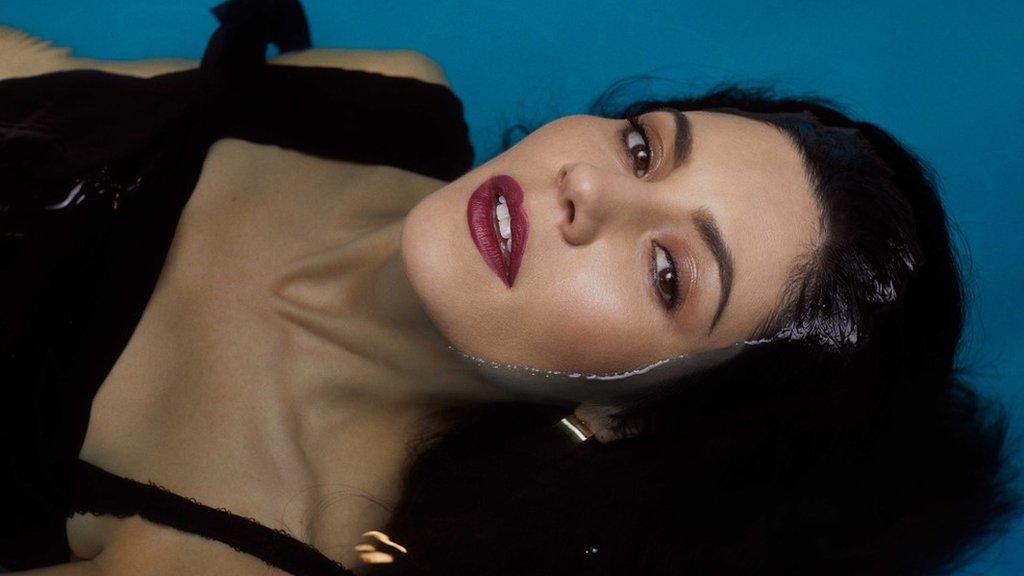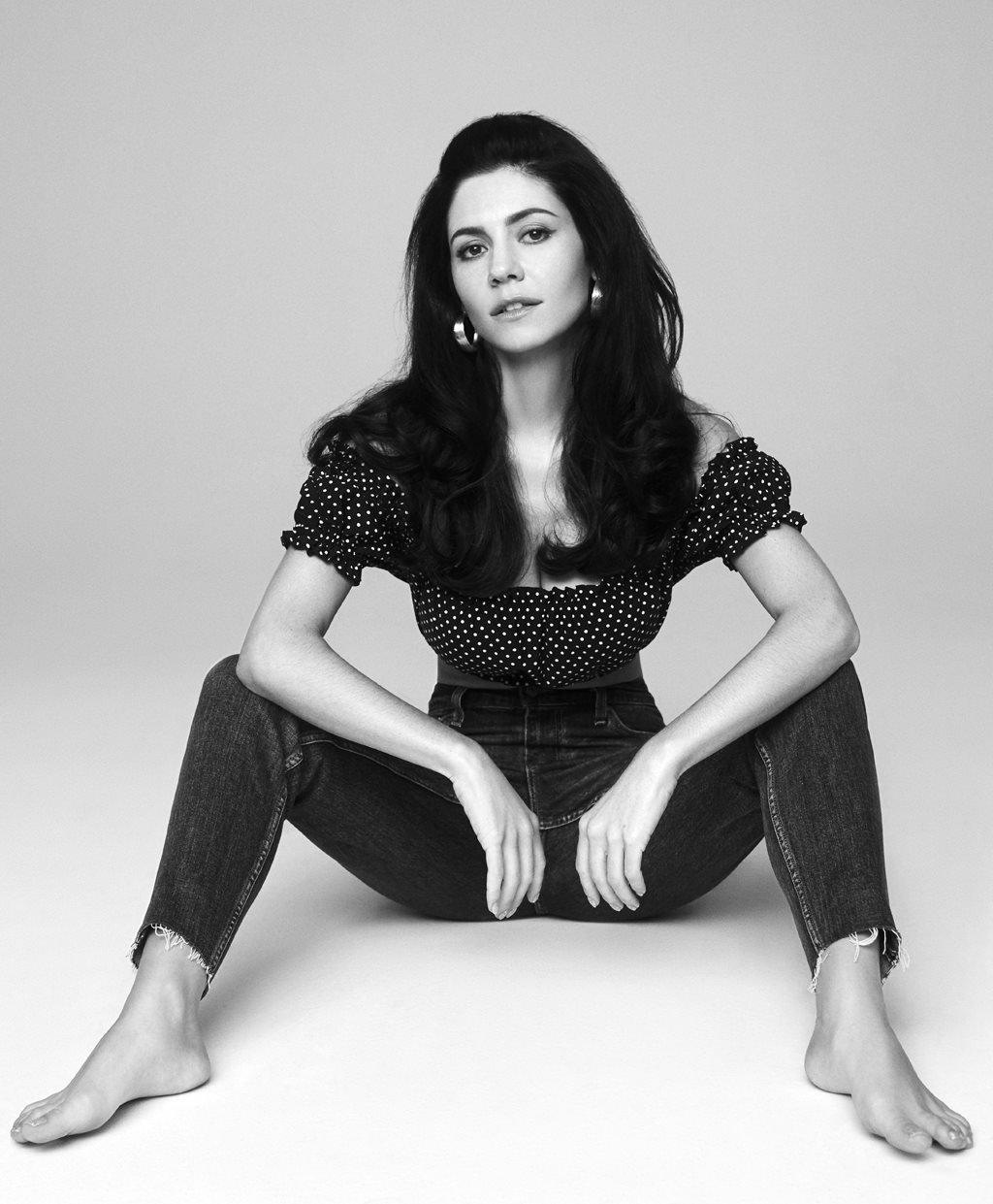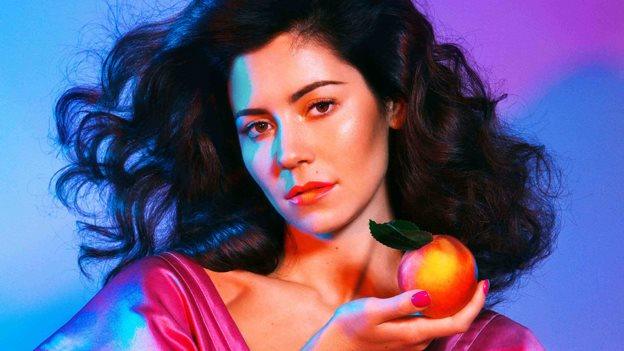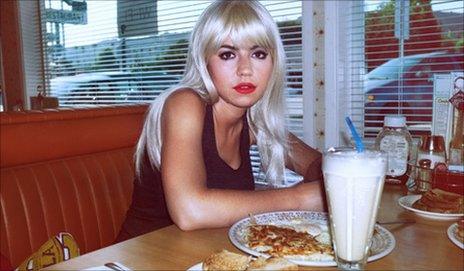Marina loses her Diamonds and finds herself
- Published

Marina: "I reached a point where I feel at peace inside."
Three years ago, Marina Diamandis wrapped up her Neon Nature tour, convinced she was going to quit the music industry for good.
"I just did not want to have my face on anything again," she says.
"I knew I couldn't continue with music in the same way any more. I couldn't imagine going back to releasing a record. I didn't know how I would ever get there.
"And that's great, that's totally fine - but from there, where do you go? That was the hardest thing to work through.
"I felt so stuck for a long time."
The problem wasn't necessarily creative burnout. Her aunt and grandmother had died in quick succession while she was on tour. Unable to cancel or postpone the shows, she was faced with going on stage every night while coping with a very personal and private grief.
The stress led to panic attacks and depression, and Marina began to question whether the career she'd craved since her childhood was really worth it.
"I had such a fractured sense of who I was because so much of my identity was attached to music - and if I didn't want to do that any more, then what can I contribute to the world? What am I good at? What's my purpose? What makes me feel happy?
"I just didn't know. I had no idea."
Back to school
In an attempt to answer those questions, she enrolled in acting classes, but found the performative aspect too similar to music.
After dabbling in floristry and looking into falconry, she ended up studying psychology at Birkbeck University of London.
"I just love developmental psychology," she enthuses. "I'm really interested in why we behave the way we do. Part of the research was studying twins who'd been separated at birth; and which traits are hereditary and which ones are to do with your environment and upbringing."
The course required long days in the library, researching and writing essays - a solitary, almost meditative process that slowly unlocked the singer's creative impulse.
"How it came full circle was actually just acknowledging I didn't want to do music at that specific moment, and I could quit and that would be fine.
"And once I allowed myself to quit, I felt like I opened up inside."
One of the first songs she completed was Handmade Heaven, a sombre, introspective ballad that addressed her anguish and alienation.
"I could no longer ignore / The ivy growing tall," she sings. "This life don't suit me anymore / The writing's on the wall."
Allow YouTube content?
This article contains content provided by Google YouTube. We ask for your permission before anything is loaded, as they may be using cookies and other technologies. You may want to read Google’s cookie policy, external and privacy policy, external before accepting. To view this content choose ‘accept and continue’.
Notably, the song was released under the star's first name - reflecting a shift away from her former pop persona, Marina and the Diamonds.
The new nomenclature ruffled a few feathers (the diamonds represented Marina's fans) but for the 33-year-old, it was an important step towards protecting herself.
"I love and adore all support for my music," she told Dazed magazine earlier this year, external, "but people online don't own me, and I won't give them any illusion that they have any kind of entitlement."
What they get instead is a gorgeous double album, which combines the kooky vitality of her debut, The Family Jewels, the pop sheen of its follow-up, Electra Heart, and the introspective songcraft of 2015's Froot.
"It's weird to talk about it in terms of old records, but I know what you mean," she says. "I kind of held my horses and didn't try to make it any one thing."
To assist her, Marina brought in a hand-picked selection of collaborators, including her boyfriend Jack Patterson from Clean Bandit, and Lorde's frequent co-writer Joel Little.
It was a bold step for the singer, who'd sworn off the pop production line after a bad experience on her second album.
Allow YouTube content?
This article contains content provided by Google YouTube. We ask for your permission before anything is loaded, as they may be using cookies and other technologies. You may want to read Google’s cookie policy, external and privacy policy, external before accepting. To view this content choose ‘accept and continue’.
In 2015, Marina told the BBC that "co-writing is killing pop" - but she says songwriting sessions have changed dramatically since the days when labels demanded armour-plated radio hits in the style of Katy Perry or Kylie Minogue.
"Culturally, songwriting's changed quite a lot. It's become a lot more fluid and fun," she explains.
"I don't feel like, 'Oh my God, I've got to write a hit'. It's like, 'I'm going to write a song with people I really like.'"
The alternative still exists, of course, and Marina says it can be painfully obvious when a song has emerged from a songwriting camp, where dozens of producers compete to write the best hooks.
"You're like, 'Ah, that's a writing session song,' and you know they've worked really hard on it" she says.
"Sometimes I really enjoy that, like, 'God that hook is soooo good.' And I think I could probably have gone that way if I'd needed to or wanted to, but I don't write for that reason," she says.

The singer is also taking a new approach to her live shows, with a band of musicians who double as dancers

By shedding expectations of who she should be - both external and self-imposed - it seems that Marina has found equilibrium.
The 25-year-old who sang about being "driven by a greed to succeed, external" is now 33 and finds herself "more still, or at peace inside".
You can hear it in the single, Orange Trees, which evokes the tranquillity she found on the Greek island of Lefkada, where her father's side of the family comes from.
On the similarly summery Enjoy Your Life, she tells herself: "Sit back and enjoy your problems / You don't always have to solve them."
"I'm someone who really loves ticking things off a list," she explains, "but at some point you've got to realise that the human experience is incredibly messy".
"I feel like, even if I tick all the things off one day, the next I'm going to wake up and there's more to do, so I may as well give up and enjoy myself."
She pauses, and asks if "looking after yourself is a weird thing to be talking about in a song?"
Almost certainly not. In fact, Marina's been talking about mental health since her first single, Obsessions, in 2009, since when it's become an increasingly visible topic in pop.
"I know!" laughs Marina. "Just as I've become my most stable ever."
Love and Fear is out now on Atlantic Records.

Follow us on Facebook, external, on Twitter @BBCNewsEnts, external, or on Instagram at bbcnewsents, external. If you have a story suggestion email entertainment.news@bbc.co.uk, external.
- Published11 March 2015

- Published10 October 2011
